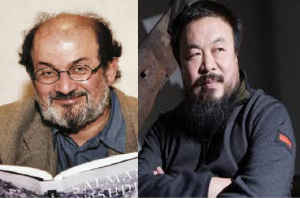Last October the Chinese artist Ai Weiwei covered the floor (of the immense Turbine Hall at London’s Tate Moderny) with his “Sunflower Seeds”: 100 million tiny porcelain objects, each handmade by a master craftsman, no two identical. The installation was a carpet of life, multitudinous, inexplicable and, in the best Surrealist sense, strange. The seeds were intended to be walked on, but further strangeness followed. It was discovered that when trampled they gave off a fine dust that could damage the lungs. These symbolic representations of life could, it appeared, be dangerous to the living. The exhibition was cordoned off and visitors had to walk carefully around the perimeter….
Art can be dangerous. Very often artistic fame has proved dangerous to artists themselves. Mr. Ai’s
work is not polemical — it tends towards the mysterious. But his immense prominence as an artist (he was a design consultant on the “bird’s nest” stadium for the Beijing Olympics and was recently ranked No. 13 in Art Review magazine’s list of the 100 most powerful figures in art) has allowed him to take up human rights cases and to draw attention to China’s often inadequate responses to disasters (like the plight of the child victims of the 2008 earthquake in Sichuan Province or those afflicted by deadly apartment fires in Shanghai last November). The authorities have embarrassed and harassed him before, but now they have gone on a dangerous new offensive ….
The lives of artists are more fragile than their creations. The poet Ovid was exiled by Augustus to a little hell-hole on the Black Sea called Tomis, but his poetry has outlasted the Roman Empire. Osip Mandelstam died in a Stalinist work camp, but his poetry has outlived the Soviet Union. Federico García Lorca was killed by the thugs of Spain’s Generalissimo Francisco Franco, but his poetry has survived that tyrannical regime.
…..Mr. Ai is not the only Chinese artist in dire straits. The great writer Liao Yiwu has been denied permission to travel to the United States to attend the PEN World Voices Festival of International Literature, which begins in New York on Monday, and there are fears that he could be the regime’s next target. Among the others are Ye Du, Teng Biao and Liu Xianbin — who was sentenced last month to prison for incitement to subversion, the same charge leveled against the Nobel Peace Prize laureate Liu Xiaobo, now serving an 11-year term.
